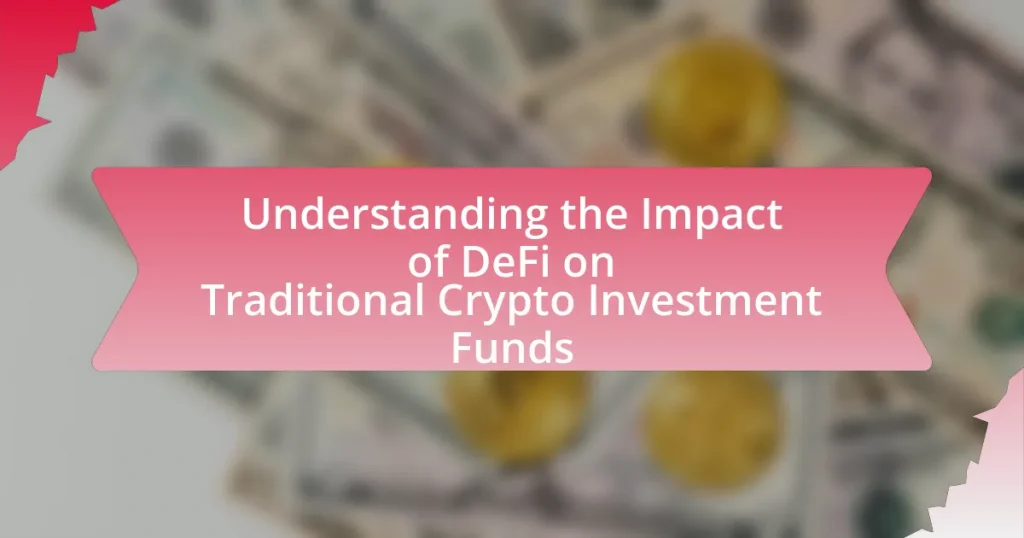The article examines the significant impact of Decentralized Finance (DeFi) on traditional crypto investment funds, highlighting both opportunities and challenges for fund managers. It discusses how DeFi’s reliance on blockchain technology and smart contracts facilitates peer-to-peer transactions, reduces costs, and enhances liquidity, compelling traditional funds to adapt their strategies. Key characteristics of DeFi, such as transparency and programmability, are contrasted with traditional finance models, emphasizing the need for traditional funds to integrate DeFi solutions to remain competitive. The article also addresses potential risks, regulatory challenges, and emerging investment strategies, ultimately forecasting a future of increased collaboration between DeFi and traditional finance.

What is the Impact of DeFi on Traditional Crypto Investment Funds?
The impact of DeFi on traditional crypto investment funds is significant, as it introduces new opportunities and challenges for fund managers. DeFi platforms enable direct peer-to-peer transactions, reducing reliance on intermediaries, which can lower costs and increase efficiency for investment funds. Additionally, DeFi offers innovative financial products, such as yield farming and liquidity pools, which can enhance returns for investors. According to a report by Deloitte, the total value locked in DeFi protocols reached over $80 billion in 2021, indicating a growing trend that traditional funds must adapt to in order to remain competitive. This shift compels traditional investment funds to reevaluate their strategies, potentially integrating DeFi solutions to attract a broader investor base and improve portfolio performance.
How does DeFi differ from traditional finance models?
Decentralized Finance (DeFi) differs from traditional finance models primarily in its reliance on blockchain technology and smart contracts, which eliminate intermediaries. In traditional finance, transactions typically require banks or financial institutions to facilitate and verify exchanges, leading to higher costs and slower processes. In contrast, DeFi operates on a peer-to-peer basis, allowing users to engage directly with financial services such as lending, borrowing, and trading without intermediaries, resulting in lower fees and faster transactions. Additionally, DeFi platforms are open-source and accessible to anyone with an internet connection, promoting financial inclusion, while traditional finance often imposes barriers such as credit checks and geographical limitations.
What are the key characteristics of DeFi?
Decentralized Finance (DeFi) is characterized by its reliance on blockchain technology, enabling peer-to-peer transactions without intermediaries. Key characteristics include transparency, as all transactions are recorded on public ledgers; programmability, allowing for smart contracts that automate processes; and accessibility, providing financial services to anyone with internet access. Additionally, DeFi promotes composability, where different protocols can interact and build upon each other, and offers liquidity through decentralized exchanges. These features collectively enhance financial inclusion and innovation in the financial sector.
How do these characteristics challenge traditional investment funds?
Decentralized Finance (DeFi) characteristics challenge traditional investment funds by introducing greater accessibility, transparency, and efficiency. Traditional investment funds often rely on intermediaries, which can create barriers to entry and increase costs; DeFi eliminates these intermediaries, allowing users to participate directly in financial markets. Furthermore, DeFi protocols operate on blockchain technology, providing real-time transparency of transactions and asset management, which contrasts with the opaque nature of many traditional funds. This shift towards decentralized systems can lead to reduced fees and faster transaction times, compelling traditional funds to adapt or risk losing market share.
What are the potential benefits of DeFi for traditional investment funds?
DeFi offers several potential benefits for traditional investment funds, including enhanced liquidity, reduced costs, and increased access to diverse investment opportunities. Enhanced liquidity arises from decentralized exchanges that allow for quicker asset trading without intermediaries, which can lead to better pricing and lower slippage. Reduced costs are achieved through the elimination of traditional financial intermediaries, resulting in lower fees for transactions and management. Additionally, DeFi provides access to a broader range of investment products, such as yield farming and liquidity pools, which can enhance portfolio diversification and potential returns. These benefits are supported by the rapid growth of DeFi platforms, which have seen total value locked exceed $100 billion, indicating strong market interest and participation.
How can DeFi enhance liquidity for investment funds?
DeFi enhances liquidity for investment funds by enabling instant access to capital through decentralized exchanges and liquidity pools. These platforms allow investment funds to trade assets without intermediaries, facilitating quicker transactions and reducing slippage. For instance, Uniswap, a leading decentralized exchange, allows users to provide liquidity in exchange for fees, thus increasing the overall liquidity available for trading. Additionally, DeFi protocols often offer yield farming opportunities, where funds can earn returns on idle assets, further enhancing liquidity. According to a report by Messari, the total value locked in DeFi reached over $80 billion in 2021, demonstrating the significant liquidity that these platforms can provide to investment funds.
What role does transparency play in the relationship between DeFi and traditional funds?
Transparency is crucial in the relationship between DeFi and traditional funds as it fosters trust and accountability. In decentralized finance, transparency is achieved through blockchain technology, which allows all transactions to be publicly verifiable and immutable. This level of openness contrasts with traditional funds, where operations and financials are often opaque, leading to potential mistrust among investors. For instance, a study by the Cambridge Centre for Alternative Finance highlights that 70% of DeFi users prioritize transparency when choosing platforms, indicating that this attribute significantly influences investor confidence and participation. Thus, transparency not only enhances the credibility of DeFi but also encourages traditional funds to adopt similar practices to remain competitive and attract investors.
What risks do traditional investment funds face from DeFi?
Traditional investment funds face several risks from decentralized finance (DeFi), including regulatory uncertainty, market volatility, and security vulnerabilities. Regulatory uncertainty arises as DeFi operates in a largely unregulated space, potentially exposing traditional funds to legal challenges and compliance issues. Market volatility is heightened in DeFi due to the rapid price fluctuations of cryptocurrencies, which can lead to significant losses for traditional funds that invest in these assets. Security vulnerabilities are a critical concern, as DeFi platforms have been targets for hacks and exploits, resulting in substantial financial losses; for instance, in 2021 alone, DeFi protocols lost over $1.3 billion to hacks, according to a report by Chainalysis. These risks collectively threaten the stability and profitability of traditional investment funds engaging with DeFi.
How does volatility in DeFi markets affect traditional funds?
Volatility in DeFi markets significantly impacts traditional funds by increasing risk exposure and influencing investment strategies. Traditional funds, which often rely on stable asset valuations, may experience heightened uncertainty as DeFi assets can fluctuate dramatically, sometimes exceeding 20% in a single day. This volatility can lead to increased hedging costs and necessitate adjustments in asset allocation to mitigate potential losses. Furthermore, the correlation between DeFi assets and traditional financial markets has been observed to rise during periods of market stress, as evidenced by the 2020 market crash when both sectors experienced simultaneous downturns. Consequently, traditional funds may need to adopt more dynamic risk management practices to navigate the unpredictable nature of DeFi markets effectively.
What regulatory challenges arise from the integration of DeFi?
The integration of DeFi presents several regulatory challenges, primarily due to its decentralized nature, which complicates the enforcement of existing financial regulations. Traditional regulatory frameworks often rely on identifiable entities for compliance, but DeFi operates without central authorities, making it difficult to apply these regulations effectively. For instance, the lack of a central operator means that anti-money laundering (AML) and know-your-customer (KYC) requirements are challenging to enforce, as users can transact pseudonymously. Additionally, the rapid innovation in DeFi products outpaces regulatory responses, leading to gaps in consumer protection and potential market manipulation. These challenges necessitate a reevaluation of regulatory approaches to ensure they can adapt to the unique characteristics of decentralized finance.

How is DeFi influencing the strategies of traditional crypto investment funds?
DeFi is significantly influencing the strategies of traditional crypto investment funds by encouraging diversification and the adoption of yield-generating assets. Traditional funds are increasingly allocating capital to DeFi protocols to enhance returns through liquidity provision, staking, and yield farming, which offer higher interest rates compared to conventional investments. For instance, a report by Deloitte highlights that over 60% of institutional investors are exploring DeFi opportunities to optimize their portfolios and manage risk more effectively. This shift reflects a broader trend where traditional funds are integrating DeFi strategies to remain competitive and capitalize on the growing decentralized finance market.
What new investment strategies are emerging due to DeFi?
New investment strategies emerging due to DeFi include yield farming, liquidity mining, and decentralized autonomous organization (DAO) investments. Yield farming allows investors to earn returns by providing liquidity to DeFi protocols, often resulting in higher yields compared to traditional investments. Liquidity mining incentivizes users to supply liquidity by rewarding them with tokens, enhancing engagement and capital flow within DeFi ecosystems. Additionally, DAOs enable collective investment decisions, allowing participants to pool resources and vote on investment opportunities, thus democratizing access to investment strategies. These strategies reflect a shift towards more decentralized, participatory, and potentially higher-yielding investment avenues in the crypto space.
How are traditional funds adapting their portfolios to include DeFi assets?
Traditional funds are adapting their portfolios to include DeFi assets by allocating a portion of their investments to decentralized finance protocols and tokens. This shift is driven by the potential for higher yields and diversification benefits that DeFi offers compared to traditional financial instruments. For instance, funds are increasingly investing in liquidity pools, yield farming opportunities, and DeFi lending platforms, which can provide returns that significantly exceed those available in conventional markets. According to a report by Fidelity Digital Assets, 36% of institutional investors have already invested in digital assets, including DeFi, indicating a growing acceptance and integration of these assets into traditional investment strategies.
What are the implications of yield farming for traditional investment strategies?
Yield farming significantly alters traditional investment strategies by introducing high-risk, high-reward opportunities that challenge conventional asset allocation principles. Traditional investment strategies often prioritize stability and predictable returns, whereas yield farming can offer returns exceeding 100% annually, as evidenced by platforms like Yearn.finance and Compound, which have reported substantial yields. This shift encourages investors to reconsider risk tolerance and liquidity preferences, as yield farming typically requires locking assets in smart contracts, exposing them to potential smart contract vulnerabilities and market volatility. Consequently, traditional investors may need to adapt their risk management frameworks and diversify their portfolios to include decentralized finance (DeFi) assets, reflecting a broader trend towards integrating innovative financial technologies into established investment practices.
How are traditional funds leveraging DeFi technologies?
Traditional funds are leveraging DeFi technologies primarily by integrating decentralized finance protocols to enhance liquidity, reduce costs, and improve operational efficiency. For instance, many traditional investment funds are utilizing automated market makers (AMMs) and liquidity pools to access capital more efficiently than through conventional financial systems. This shift allows funds to execute trades with lower slippage and better pricing. Additionally, the use of smart contracts in DeFi enables traditional funds to automate processes such as compliance and reporting, thereby minimizing administrative overhead. According to a report by Deloitte, 76% of financial services executives believe that blockchain and DeFi will significantly impact their operations, highlighting the growing trend of traditional funds adopting these technologies to remain competitive and innovative in the evolving financial landscape.
What tools and platforms are being utilized by traditional funds in the DeFi space?
Traditional funds in the DeFi space utilize tools and platforms such as Uniswap for decentralized trading, Aave for lending and borrowing, and Compound for interest-earning on crypto assets. These platforms enable traditional funds to engage in liquidity provision, yield farming, and asset management in a decentralized manner. For instance, Uniswap’s automated market-making protocol allows funds to trade without intermediaries, while Aave and Compound facilitate decentralized lending, providing traditional funds with opportunities to earn interest on their holdings. The adoption of these tools reflects a growing trend among traditional investment entities to leverage DeFi’s innovative financial services.
How does the use of smart contracts impact traditional investment processes?
The use of smart contracts significantly streamlines traditional investment processes by automating transactions and reducing the need for intermediaries. Smart contracts execute predefined conditions automatically, which minimizes human error and enhances efficiency in executing trades and managing assets. For instance, a report by the World Economic Forum estimates that by 2025, 10% of global GDP could be stored on blockchain technology, indicating a substantial shift towards automated and decentralized financial systems. This transition allows for faster settlement times and lower transaction costs, fundamentally altering how investments are managed and executed in traditional finance.

What future trends can we expect in the relationship between DeFi and traditional investment funds?
The relationship between DeFi and traditional investment funds is expected to trend towards increased collaboration and integration. As traditional investment funds recognize the efficiency and transparency offered by DeFi platforms, they are likely to adopt hybrid models that incorporate decentralized finance solutions. For instance, a report by Deloitte highlights that 76% of financial services executives believe blockchain technology will disrupt their industry, indicating a shift towards embracing DeFi innovations. Additionally, regulatory frameworks are anticipated to evolve, allowing traditional funds to engage more freely with DeFi assets, thereby enhancing liquidity and investment opportunities. This convergence will likely lead to the development of new financial products that blend traditional investment strategies with DeFi mechanisms, further bridging the gap between these two sectors.
How might regulatory changes shape the future of DeFi and traditional funds?
Regulatory changes will significantly shape the future of DeFi and traditional funds by establishing clearer compliance frameworks that can enhance investor protection and market integrity. As governments and regulatory bodies around the world develop guidelines for digital assets, DeFi platforms may need to implement Know Your Customer (KYC) and Anti-Money Laundering (AML) measures, which could lead to increased legitimacy and wider adoption among institutional investors. For traditional funds, adapting to these regulations may involve integrating DeFi technologies to remain competitive, potentially leading to hybrid models that combine traditional finance with decentralized finance. Historical examples, such as the SEC’s actions on ICOs, demonstrate that regulatory clarity can drive innovation while ensuring that market participants operate within a safe and structured environment.
What innovations in DeFi could further disrupt traditional investment models?
Innovations in DeFi that could further disrupt traditional investment models include automated market makers (AMMs), yield farming, and decentralized autonomous organizations (DAOs). AMMs enable users to trade assets without relying on order books, increasing liquidity and reducing costs, as evidenced by platforms like Uniswap, which has facilitated billions in trading volume since its launch. Yield farming allows investors to earn returns on their crypto assets by providing liquidity to DeFi protocols, often yielding higher returns than traditional investments; for instance, some yield farming strategies have offered annual percentage yields (APYs) exceeding 100%. DAOs empower community governance in investment decisions, allowing token holders to vote on proposals, which can lead to more democratic and transparent investment strategies, as seen in projects like MakerDAO. These innovations collectively challenge the efficiency, accessibility, and governance structures of traditional investment models.
How will investor behavior evolve in response to DeFi developments?
Investor behavior will increasingly shift towards decentralized finance (DeFi) as developments in this sector enhance accessibility, transparency, and yield opportunities. As DeFi platforms offer higher returns compared to traditional investment vehicles, investors are likely to allocate more capital into these decentralized protocols. For instance, the total value locked in DeFi protocols surged from approximately $1 billion in early 2020 to over $80 billion by late 2021, indicating a growing trust and interest among investors. Furthermore, the rise of automated yield farming and liquidity mining strategies will attract risk-tolerant investors seeking to maximize returns, leading to a diversification of investment strategies. This evolution reflects a broader trend where investors prioritize innovative financial solutions that align with their demand for higher yields and greater control over their assets.
What best practices should traditional investment funds adopt when engaging with DeFi?
Traditional investment funds should adopt a comprehensive risk management framework when engaging with DeFi. This includes conducting thorough due diligence on DeFi protocols, assessing smart contract security, and understanding the underlying technology and market dynamics. For instance, funds should utilize tools like audits from reputable firms and engage in stress testing to evaluate potential vulnerabilities. Additionally, establishing clear governance structures and compliance measures is essential to navigate regulatory landscapes effectively. According to a report by the Financial Stability Board, the rapid growth of DeFi necessitates enhanced oversight to mitigate systemic risks, underscoring the importance of these best practices for traditional investment funds.
How can funds effectively manage risk while exploring DeFi opportunities?
Funds can effectively manage risk while exploring DeFi opportunities by implementing a diversified investment strategy, conducting thorough due diligence, and utilizing risk management tools. Diversification across various DeFi protocols and assets reduces exposure to any single point of failure, as evidenced by the fact that in 2021, over 60% of DeFi projects experienced significant volatility, highlighting the importance of spreading investments. Conducting due diligence involves assessing the security audits of smart contracts and the reputation of the projects, which is crucial since, according to a report by Chainalysis, over $1.4 billion was lost to hacks in DeFi in 2021 alone. Additionally, employing risk management tools such as stop-loss orders and liquidity pools can help mitigate potential losses, ensuring that funds can navigate the volatile DeFi landscape more effectively.
What strategies can enhance collaboration between DeFi and traditional finance?
Strategies that can enhance collaboration between DeFi and traditional finance include establishing regulatory frameworks, integrating blockchain technology, and fostering partnerships. Regulatory frameworks can provide clarity and security for both sectors, encouraging traditional financial institutions to engage with DeFi projects. Integrating blockchain technology allows for improved transparency and efficiency in transactions, which can attract traditional finance players seeking innovation. Fostering partnerships between DeFi platforms and traditional financial institutions can lead to the development of hybrid products that leverage the strengths of both systems, ultimately driving growth and adoption. These strategies are supported by the increasing interest from traditional finance in blockchain solutions, as evidenced by major banks exploring digital asset custody services and investment in DeFi projects.















